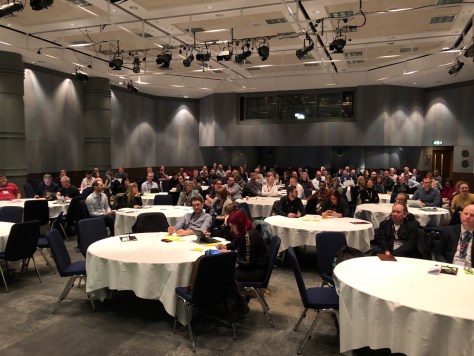Monday I was off to London for a workshop looking at Education 4.0 as well as a meeting discussing strategy. The workshop was looking at Jisc’s work in the Education 4.0 space and what others are doing in this space.
I published another couple of use cases for the Intelligent Campus blog.
Use Case: Intelligent Catering
Use Case: Intelligent Meetings
Working from home on Tuesday I had a couple of calls, though technical problems with VScene meant I didn’t get into one conference. I have no idea what the problem was, usually I don’t have an issue with VScene.
Wednesday I was into the office for an early meeting to discuss progress and objectives for my new role. I will be continuing some existing objectives on thought leadership (I know, I also hate the term); looking at the learning and research technical career pathway in Jisc; increasing member understanding of Jisc’s learning, teaching and student experience portfolio. In addition I am reviewing the HE and student experience strategy for 2020 onwards. Review our portfolio for the OfS and support a value study at the University of Hertfordshire (I discussed this back in March).
I had similar technical problems with VScene again, I was even using a different computer and browsers. I think I may have narrowed down the problem to my Bluetooth wireless headset. So next time I am going to use a wired headset and see if that makes a difference.
Had a meeting to discuss some future ideas in a space that is new to me and to Jisc. Where could we apply our work in digital capabilities and analytics in new spaces.
Most of the afternoon I was doing a dry run through the Agile Implementation Workshop I am helping run next week in London. I am talking about reporting and also doing an introductory demo of JIRA. Sometimes the value of a tool such as JIRA is not the value it adds to the individual using the tool, but the combined and added value you get when everyone in a team uses that tool. Reporting is something else that often is seen as a process between two people, but aggregated reports are valuable to a range of stakeholders in an organisation.
Had an interesting discussion with Lawrie on Thursday morning following a demonstration he had seen the day before.
Microsoft Teams is the digital hub that brings conversations, content, and apps together in one place. Create collaborative classrooms, connect in professional learning communities, and communicate with all staff – all from a single experience in Office 365 Education.
I’ve not looked in detail at all aspects of what makes Teams a possible VLE, though there are some key aspects of Teams that make it appealing as a VLE or LMS. It has all the functions you expect from a VLE or LMS, such as content, communication (individual and group) and assessment. You can connect a wide range of apps to Teams, you like using Twitter for tweetchats, connect it in.
This reminds me of the concept of the VLE I proposed at the infamous VLE is Dead debate at ALT-C in 2009 (was that really ten years ago now). I saw the VLE still being the centre of the student online learning environment, but other tools and services would plug into it.
Today we have the technology to make that a reality. It can be done with Teams, but similar connectors and connnections exist for tools such as Moodle. From a student perspective, they will be using a tool (and a suite of tools connected to that) they will potentially be using in the future. Yes of course the skills that you gain using tools such as Moodle and Blackboard (and Google Apps) are skills that are transferable, but not everyone sees them in that way, both students and employers.
There are already universities and colleges out in the sector using Teams as their VLE, I am interested in not just who is using Teams as their VLE, but also how they are using it, and how embedded it is into practice.
One thing that I noted was that, it’s all very well having a great tool, it’s quite another thing to understanding and knowing the potential of the functionality of that tool to enhance and enrich the student experience. It’s also another thing to have that functionality exploited by staff and students.
I spent some time setting up a Confluence Site and JIRA project for the Agile Implementation Workshop next week, I didn’t want to do something “not real” so will be using the sites and boards for work I am doing for our Learning & Research Technical Career Pathway.
A shorter week this week, due to the Easter holiday weekend, so also means a later start next week as well.
My top tweet this week was this one.
Does anyone have any cake?
— James Clay (@jamesclay) April 17, 2019













